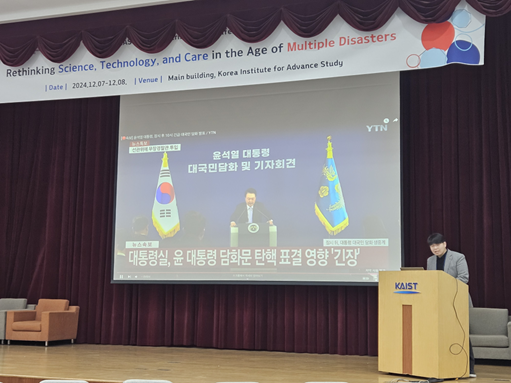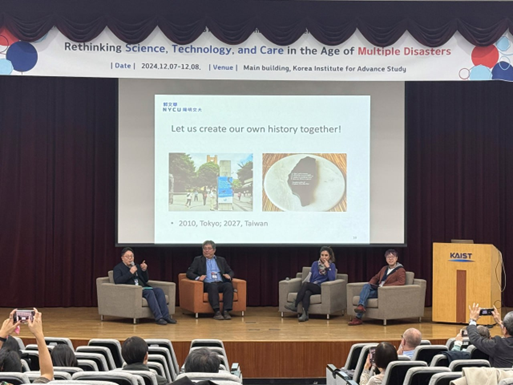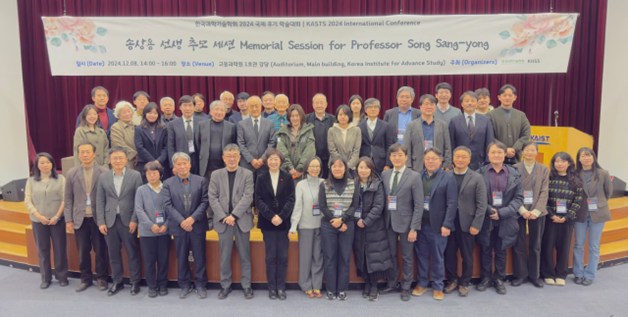Rethinking Science, Technology, and Care in the Age of Multiple Disasters: Report from the KASTS 2024 International Conference
Authors: Youjung Shin & So Yeon Leem, Korean Association of Science and Technology Studies (KASTS)Editor: Auriane van der Vaeren, 4S Backchannels
October 22, 2025 | Report-Backs
Multiple Disasters, Care, and STS
On December 7-8, 2024, the Korean Association of Science and Technology Studies (KASTS) hosted its international conference under the theme Rethinking Science, Technology, and Care in the Age of Multiple Disasters at the Korea Institute for Advanced Study in Seoul. No one could have predicted how timely this theme would prove to be. Only four days before the conference opened, the South Korean president abruptly declared martial law in the name of “protecting the liberal constitutional order”. Political activities were suspended, press freedom revoked, and uncertainty gripped the country. Although the martial law was lifted within a day, the turbulence continued, culminating in a dramatic impeachment vote in the National Assembly on the very evening of December 7—the first day of the conference.
This extraordinary context shaped the atmosphere of the gathering. Upon arrival, international participants asked Korean colleagues whether it was safe, what exactly had happened, and how ordinary life continued under such political instability. Their questions resonated directly with the conference theme: living, thinking, and caring in an age of multiple disasters. The conference’s opening ceremony even turned into a live experience when participants from around the world watched together the coincidental nationwide broadcasting of the Korean president’s live address regarding the impeachment (Figure 1). It was an uncanny moment that also underscored the role of digital media and ICT in mediating disaster, and the urgent need for transnational solidarity in times of political, ecological, and social upheaval.

Figure 1 (credit: Youjung Shin)
The 2024 theme of disasters and care reflected the Korean STS community’s ongoing response to recurring national traumas: from the Sewol ferry disaster and the Itaewon crowd crush to COVID-19 and climate change. The term disaster (jae-nan, 재난) in Korean connotes both natural calamities and social or political crises. Likewise, care (dol-bom, 돌봄) extends beyond family duty and includes broader practices of sustaining life under inequality and ecological breakdown. Former KASTS president, Professor Young-Gyung Paik, a leading feminist STS scholar, has been instrumental in expanding the meaning of care as “activities that generate new ways of relating and reorganizing the world”. Considering that feminist STS remains relatively marginalized in Korea, her leadership and the choice of this theme carried particular significance.
The Academic Infrastructure of East Asian STS
The first day of the conference featured presentations ranging from maritime logistics and rare earth extraction in Southeast Asia to disaster memory in Japan and disability and rehabilitation in Korea and China. It also included a keynote by Professor Wen-Hua Kuo (National Yang-Ming University), incoming president of 4S, titled: Historicizing East Asian STS: Some Reflections in the Age of Global STS. Professor Kuo revisited Needham’s puzzle—the question of why modern science developed in Europe rather than in China—as an academic infrastructure that had long shaped East Asian STS. By conceptualizing infrastructure as both a subject of STS and a metaphor for East Asian STS, Professor Kuo’s lecture reminded participants that regional networks, journals, and collaborations have been crucial infrastructures for knowledge-making. It also invited to reflect on how these infrastructures might evolve—through differentiation, entanglement, and care. He suggested that the next step for the field lies not in finding another single guiding question, but in cultivating interlinked ideas and practices rooted in local problems, as reflected in his presentation’s end call, “Let us create our own history together!” (Figure 2).

Figure 2 (credit: KASTS)
The Academic Infrastructure of Korean STS
As Professor Kuo emphasized, many of the questions raised at the KASTS conference emerged from locally situated concerns. One striking example was the session organized by the KASTS Accessibility Committee, When STS Meets Disability Studies: Critiques and Ways Forward. Though expected to draw mainly a Korean audience, it attracted significant international interest. This was encouraging, as KASTS is among the first Korean academic associations to establish an Accessibility Committee. Introducing disability studies and accessibility issues, today, characteristic of Korean STS, was an initiative initially brought up by women graduate students and early-career researchers.
The conference further also held a deeply moving memorial session honoring Professor Sang-yong Song (1937-2024), a pioneering figure in the history and philosophy of science, STS, and bioethics in Korea. Co-organized with the Korean History of Science Society, the session gathered colleagues, students, and international peers to reflect on Song’s intellectual legacy (Figure 3). His critical stance against scientism, technological determinism, and ecological neglect foregrounded the social responsibility of science and laid the foundation for STS in Korea as a transformative practice. In this sense, one of his key contributions was to envision and promote “science for humanity”, linking scholarly critique with ethical and political engagement. The session became a collective moment of reflection on how Korean scholars might care for and renew their academic infrastructure—revisiting the foundations laid by earlier generations while envisioning new connections across borders and generations.

Figure 3 (credit: KASTS)
Caring for the Infrastructure of Korean STS
Both Professor Kuo’s reflections on East Asian STS and the memorial session about Professor Song’s legacy evoked pride in how scholars across the region have built a shared intellectual tradition through decades of dialogue and collaboration. Yet, this history has largely relied on the institutional legacy of the scholarship of History of Science and on networks that were throughout much of their development male-dominated. Recognizing these foundational traits of Korean STS is not to diminish their value, but to understand the conditions from which a new generation of scholars now seeks to move forward.
The future of Korean STS will be shaped through its dynamic engagement with the present—by responding to emerging social, political, and technological challenges in real time. The timing of the conference was symbolic: only four months later, the president who had declared martial law was impeached in a movement led largely by young women. It was thus meaningful that KASTS’s first international conference was organized under the theme of care, a concept that speaks to both social responsibility and the rebuilding of academic communities. KASTS now seeks to position Korean STS more clearly at regional and international levels, contributing to global STS not as a follower but as a source of new concepts and critical perspectives. This conference showed that KASTS stands at a decisive turning point—with caring for the infrastructure of Korean STS at its core.
Youjung Shin, Associate Professor at Jeonbuk National University
So Yeon Leem, Assistant Professor at Dong-A University
Both authors previously served as Research Committee members of the Korean Association of Science and Technology Studies (KASTS). Leem is currently the Editor-in-Chief of the Journal of Science & Technology Studies (과학기술학연구), KASTS’s official journal.
Published: 10/22/2025
